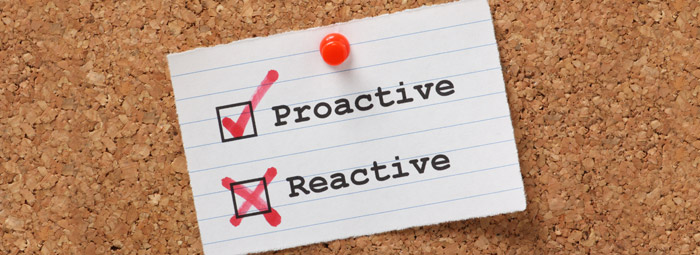
“Reactive people are often affected by their physical environment. If the weather is good, they feel good. If it isn’t, it affects their attitude and performance. Proactive people carry their own weather with them.” ~Stephen Covey
Being Reactive.
We’ve all done it.
Looked through the window to see rain and grey clouds and decided it’s a miserable day. Been criticized by someone at work or home and consequently felt down for hours afterwards. Watched our sports team win a game and felt on cloud nine for a week.
For better or worse, these are all examples of reactive behaviour, where our feelings depend on the results of external events or processes that we have no control over. They are completely outside our sphere of influence, yet they can control our lives.
We’ve all heard phrases like:
“If only they treated me a bit better, I could be happy”.
“I have to do this because…”.
“I wish I had more time for that, but…”.
We are all guilty of being reactive from time to time, often without even knowing. I know I’m guilty.
But whether we realize it or not, we choose to subordinate ourselves to those forces that are outside our sphere of influence. We choose to experience happiness, unhappiness, anger, frustration, boredom or elation. We choose to create the habits of wallowing in self-pity, shifting the blame, and feeling powerless.
Being Proactive.
When we are told that the situations we find ourselves in and the emotions we experience are largely from our own doing, it can be hard to accept. It involves a huge paradigm shift, with us taking responsibility for our current circumstances.
The natural reaction is often to resist and to argue otherwise, until eventually the light bulb flicks on. As Oprah says the, ‘Ahaaa’ moment occurs – the realization that we are in fact in control. If we can choose to be reactive and be controlled by external factors, we can also choose not to be. We don’t have to be influenced by unpredictable events or the negative emotions of others.
When we are proactive, we only concern ourselves with things that are inside our sphere of influence, rather than worrying about things we can’t do anything about. We look towards what we are able to control and change, and this includes the way we react to any given situation.
We can’t always directly alter how someone else behaves or talks to us. We have no control over the weather. We don’t even have a say in how our favourite team will do on the weekend. But we can choose our thought processes and our responses.
You stop thinking that the external circumstances need to change, and realize that you can instead alter yourself internally. The proactive approach is one that deals with things from the inside-out perspective.
And it applies to all sorts of situations. In business; where you work to your strengths and contribute as much as you can to the company rather than letting external factors bring you down. It even applies to healthcare. For example, the traditional medical model often treats people in quite a reactive way. When there is a problem, they try to respond to it, often by treating the patient’s symptoms – this is an outside-in approach. Eating right and adding more exercise to your routine can be used as a preemptive measure to avoid certain health concerns in the future – the inside-out approach.
Applying Proactivity
How can we apply this thinking to our everyday lives? How can we make the shift from reactivity to proactivity? Here are a few things to try:
- Notice your reactive behaviour. Begin with the little things, not with the death of a loved one or the suffering of innocent people. Just the everyday situations; in work perhaps, or in your relationships. Notice your reactive behaviour when it occurs, in the moment. Also note how many others do the same and how easy it is to be reactive. Don’t judge, just watch.
- Alter your language.Our language tells us a lot about our level of reactivity or proactivity. Reactive people tend to use “I can’t”, “If only”, “I have to”. These phrases are shifting the blame to outside circumstances, getting rid of responsibility. Consciously change these to more positive, empowering phrases. “I can”, “I will”, “I want to”. A simple change in language can make a big difference.
- Analyse your past mistakes. Whilst you can control your actions, you cannot always control the consequences. Invariably, you will have made mistakes in your past – we all have. We cannot change the past, so dwelling on those mistakes is a form of reactive behaviour. Instead, accept that you made them, take whatever you can learn from them, let them go and move on.
4. Make commitments. Making goals and working towards them can help empower you and reinforce the control you have over your life. If you achieve what you set out to, you realize that you can be responsible for your circumstances, regardless of the external forces.
Leave a Reply
You must be logged in to post a comment.